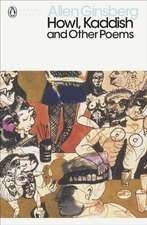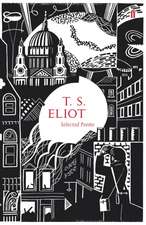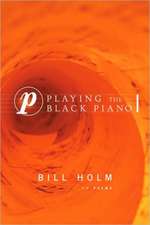A Hotel Lobby at the Edge of the World
Autor Adam Clayen Limba Engleză Paperback – 31 mar 2012
Clay pays attention to the poet's return to the world of his daily life, tracking the subtly shifting tenors of thought that occur as the landscape around him changes. Clay is fully aware of the difficulties of Thoreau's "border life," and his poems live somewhere between those of James Wright and John Ashbery: they seek wholeness, all the while acknowledging that "a fragment is as complete as thought can be." In the end, what we encounter most in these poems is a generous gentleness--an attention to the world so careful it's as if the mind is "washing each grain of sand."
Preț: 82.08 lei
Nou
Puncte Express: 123
Preț estimativ în valută:
15.71€ • 16.34$ • 12.97£
15.71€ • 16.34$ • 12.97£
Carte disponibilă
Livrare economică 24 martie-07 aprilie
Preluare comenzi: 021 569.72.76
Specificații
ISBN-13: 9781571314413
ISBN-10: 1571314415
Pagini: 98
Dimensiuni: 137 x 211 x 8 mm
Greutate: 0.14 kg
Ediția:New.
Editura: Milkweed Editions
ISBN-10: 1571314415
Pagini: 98
Dimensiuni: 137 x 211 x 8 mm
Greutate: 0.14 kg
Ediția:New.
Editura: Milkweed Editions
Recenzii
"Clay writes in the language of dreams....Adam Clay is a fresh voice full of promise and A Hotel Lobby At The Edge Of The World is definitely worth a read."
—Gabino Iglesias, Black Heart Magazine
"At the edge of the world, you'll want to have this book. The final lines of Adam Clay’s poem, 'Scientific Method,' have been haunting me for weeks . . . Few people could write a better poetic line than Adam Clay does."
—Jeff Charis-Carlson, Iowa Press-Citizen
—Gabino Iglesias, Black Heart Magazine
"At the edge of the world, you'll want to have this book. The final lines of Adam Clay’s poem, 'Scientific Method,' have been haunting me for weeks . . . Few people could write a better poetic line than Adam Clay does."
—Jeff Charis-Carlson, Iowa Press-Citizen
"Clay writes in the language of dreams....Adam Clay is a fresh voice full of promise and "A Hotel Lobby At The Edge Of The World "is definitely worth a read."--Gabino Iglesias, "Black Heart Magazine""At the edge of the world, you'll want to have this book. The final lines of Adam Clay's poem, 'Scientific Method, ' have been haunting me for weeks . . . Few people could write a better poetic line than Adam Clay does."--Jeff Charis-Carlson, "Iowa Press-Citizen"
Notă biografică
Adam Clay is the author of The Wash (Parlor Press, 2006) and three chapbooks. His work has been published in A Public Space, Gulf Coast, and The Iowa Review. He co-edits Typo Magazine, curates the Poets in Print Reading Series at the Kalamazoo Book Arts Center, and teaches at Western Michigan University. He lives in Kalamazoo, Michigan.
Textul de pe ultima copertă
“One of the best young American poets writing today, Adam Clay engages fully with the natural world, gracefully dredging up the mysteries embedded in modern life—paper dolls clipped from the morning news, the ringing ears of lightning-strike victims—and bringing ‘the patient sadness that will outwait the memory of a spark’ to life in precise swirls of language. Each poem shimmers with physical and metaphysical insight, and Clay’s endless storms and seasons resonate with wisdom and music. This is a brilliant collection of poems.”
—Alex Lemon
“These poems are sentient and surprising as only living things can be, intimate and compelling precisely because they don’t aim to please, but to exist. In his own words, reading this book is like ‘centering yourself along unrecorded boundaries’ that Clay has somehow managed to discern for us and translate into poems that are in turns clear and strange, and always warmly memorable.”
—Bob Hicok
“These poems hover in and out of dreams, follow the mind’s wild wanderings, interrogate language, reveal the heart’s ambitions, all the while remaining brilliantly anchored to the physicality of all things earthbound. This is a book that lives as much in the curious mind as it does in the undeniable weather of the real world, and Clay travels expertly between the two with a gentle, inspired grace.”
—Ada Limón
“Adam Clay locates the poetic realm at the very limit of what is known, a hotel teetering on the flat world’s precipice, where every visitor is temporary. Not only does one hear Dickinson whisper, ‘My Business is Circumference,’ Clay arrives also with a Whitmanesque capacity for affirmation, ‘The lyrical quality of a weed.’ His poems sing themselves through their own complications, searching for that beautiful order language has no part of, but only language can reveal. ‘May I for a moment be nervous?’ the poet asks. The answer in the poems themselves is their wondrous nerve.”
—Dan Beachy-Quick
“Immediately striking about the poems in Clay’s second book is their lack of self-consciousness. . . This poet locates himself at the borders between nature and language, solitude and community, the physical and metaphysical where paradox and fragmentation are at once evaded and embraced.”
—Publishers Weekly
—Alex Lemon
“These poems are sentient and surprising as only living things can be, intimate and compelling precisely because they don’t aim to please, but to exist. In his own words, reading this book is like ‘centering yourself along unrecorded boundaries’ that Clay has somehow managed to discern for us and translate into poems that are in turns clear and strange, and always warmly memorable.”
—Bob Hicok
“These poems hover in and out of dreams, follow the mind’s wild wanderings, interrogate language, reveal the heart’s ambitions, all the while remaining brilliantly anchored to the physicality of all things earthbound. This is a book that lives as much in the curious mind as it does in the undeniable weather of the real world, and Clay travels expertly between the two with a gentle, inspired grace.”
—Ada Limón
“Adam Clay locates the poetic realm at the very limit of what is known, a hotel teetering on the flat world’s precipice, where every visitor is temporary. Not only does one hear Dickinson whisper, ‘My Business is Circumference,’ Clay arrives also with a Whitmanesque capacity for affirmation, ‘The lyrical quality of a weed.’ His poems sing themselves through their own complications, searching for that beautiful order language has no part of, but only language can reveal. ‘May I for a moment be nervous?’ the poet asks. The answer in the poems themselves is their wondrous nerve.”
—Dan Beachy-Quick
“Immediately striking about the poems in Clay’s second book is their lack of self-consciousness. . . This poet locates himself at the borders between nature and language, solitude and community, the physical and metaphysical where paradox and fragmentation are at once evaded and embraced.”
—Publishers Weekly
Descriere
The distilled, haunting, and subtly complex poems in Adam Clay’s A Hotel Lobby at the Edge of the World often arrive at that moment when solitude slips into separation, when a person suddenly realizes he can barely see the place he set out from however long ago. He now sees he must find his connection back to the present, socially entangled world in which he lives. For Clay, reverie can be a siren’s song, luring him to that space in which prisoners will begin “to interrogate themselves.”
Clay pays attention to the poet’s return to the world of his daily life, tracking the subtly shifting tenors of thought that occur as the landscape around him changes. Clay is fully aware of the difficulties of Thoreau’s “border life,” and his poems live somewhere between those of James Wright and John Ashbery: they seek wholeness, all the while acknowledging that “a fragment is as complete as thought can be.” In the end, what we encounter most in these poems is a generous gentleness--an attention to the world so careful it’s as if the mind is “washing each grain of sand.”
Clay pays attention to the poet’s return to the world of his daily life, tracking the subtly shifting tenors of thought that occur as the landscape around him changes. Clay is fully aware of the difficulties of Thoreau’s “border life,” and his poems live somewhere between those of James Wright and John Ashbery: they seek wholeness, all the while acknowledging that “a fragment is as complete as thought can be.” In the end, what we encounter most in these poems is a generous gentleness--an attention to the world so careful it’s as if the mind is “washing each grain of sand.”











